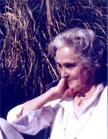
Ruth Sanford was a close friend of Carl Rogers and seemingly never tired of telling people what it was like to know and work with him.
She is not short of an idea or two of her own, as the papers below will demonstrate.
If you want to download the whole lot in a single book-sized pdf file, its
here.
Otherwise, the following links are to Ruth's own website:
http://members.tripod.com/ruthsanford/Toc.htmOn Becoming Who I am...This is the autobiography that appeared in Mel Suhd's bio-anthology Positive Regard. (excerpt)
Capetown Conversation TranscriptThis tape was made February 12,1986 at the University of Capetown. This was the second trip Carl and Ruth made to South Africa. They were more familiar with the setting but still enthusiatic about the tasks. They were also flushed with the success of the recent conference at Johannesburg where the 36 small group facilitators after finding deep, deep differences in the pre-conference preparation sessions discovered they could work together in the small groups.
ChaosThis synthesis of the new sciences has been presented many times and appears in Beyond Carl Rogers: Towards a Psychotherapy for the 21st Century, David Brazier, ed., in The Person Centered Reader, Carol Wolter-Gustafson, ed., and in French in Processus Non Lineaires d'Intervention, Paul Carle, ed. (excerpt)
Conversation at TerschellingPresented at the Fifth International Forum in the Netherlands, it is in answer to the question "What it was like to work with Carl Rogers?"
A Study of Creativity and Intelligence: Implications for CounsellorsThis study of creativity (1964) is a work of many years including research studies (the first was the Holding Power Project in which Ruth was invited by the NY State Department of Education to design research for the problem - why do some students drop out of school early and other students remain to graduate from high school), collaborations, statistical measures, and special courses like EXP (a title chosen by students, was a partnership of teachers, students, and parents in the process of education) that was written up in the second and third editions of Freedom to Learn. Carl remarked when he read it, for the first time, in the 80's, "Ruth, I had no idea about your work on creativity! Why, there are four or five doctoral dissertations here! Five!"
CreativityPresented in Moscow, it discusses the LeBoyer method of childbirth and many other aspects of creativity.
Forum 1 (ADPCA '94)These forums within a conference or International Forum started with a short address from Ruth after which she threw it open. They have served to discuss contemporary work and research and also as a platform for those who hadn't spoken at the meeting. This first one was in Tampa, Florida.
Forum 2 (Greece '95)The second forum was at the Sixth International Forum in Leptokarya. Work from Europe, the USA, and other parts of the world were discussed.
Forum 3 (Kutztown '96)This third forum was in Kutztown, Pa., May, 1996. Ruth began with a short paper on "The Psychotherapist of Tomorrow" to lead into discussion. Among the topics pursued were current work, other approaches, outreach, labor relations and the PCA, and increasing official recognition of the PCA in Michigan and Germany.
HealingThis deals with five healing moments in the USA and in the Soviet Union.. It was sent to Living Now 1998.
Inner Process of Significant ChangeThis is a discussion in Strasbourg in 1990 of the six year research project on the Inner Process of Significant Change.
Intimacy in a Person-Centered Way of Being. Do We Dare?This is a dialogue between Ruth and Barry Witz on the topic. It was presented at the First International Forum in Oatepec, Mexico, 1982.
Intimacy in the Person-Centered Way of Being.A further discussion by Ruth.
Letter To BrigitteOne summary of Ruth's experience in education in response to the question "How does the Person - Centered Approach apply to education in South Africa. See also her description of the EXP program in Freedom to Learn For the 80's, Chapter six, pp. 108-111.
Keynote on Community - ADPCA '93A short comment on community.
The Place and Value of Community in Person-Centered GroupsA more detailed presentation also given at Knoxville in 1993.
Carl Rogers and Ruth Sanford Review of their First South African tripThis is a tape that Carl and Ruth made for their host Len Holdstock at the conclusion of their 1982 visit.
The Meaning of Carl Rogers at the Opening of the 21st CenturyCenters on power and politics and the PCA.
"Unconditional Positive Regard: A Misunderstood Way of Being"A companion piece to Carl's article "Empathic: An Unappreciated Way of Being" in A Way of Being.


